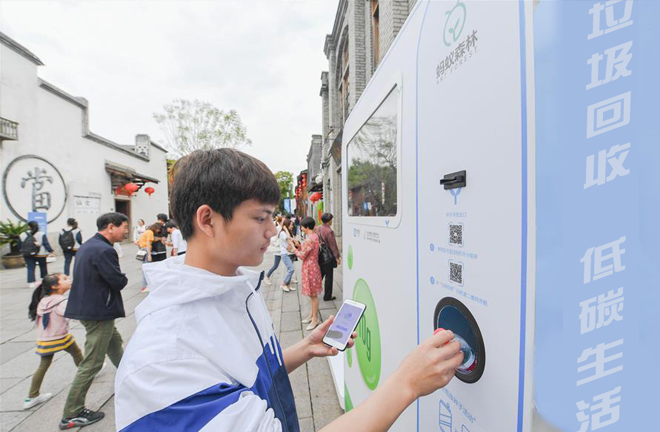Smart cities need to be people-oriented

A digital solution for smarter waste recycling in Fuzhou City, Fujian Province Photo: Song Weiwei/XINHUA
Data-driven smart cities should be people-oriented, said experts at a seminar on smart and sustainable cities in late May.
The seminar, co-organized by Shanghai Administration Institute and the Friedrich-Ebert-Stiftung (FES) Shanghai Representative Office, also shed light on the opportunities and challenges that digital transformation has brought about for urban development.
Guo Qingsong, vice president of Shanghai Administration Institute, said that building a smart city involves not only the application of new technologies such as the internet of things, sensor technology, geospatial technology, artificial intelligence and blockchain, but also deeper capabilities and values, especially sustainable development. The ultimate goal is to make people’s lives better. As such, smart cities should highlight both technological application and innovation along with the concepts of sustainable development and being people-oriented.
The transformation and development of smart cities should be centered on citizens, said Tanja Kohnen, a consultant for economics, energy, transport and environment at Bundes-SKG in Germany. Local governments need to establish a people-oriented concept based on the specific needs of residents and create more digital public services accordingly. At the same time, it is necessary to continuously explore the potential of digital smart cities, make them more acceptable to residents and allow more residents to participate in urban planning, making residents a core element in urban construction and planning.
Each city should formulate smart city development plans based on its own actual situation, said Stefan Pantekoek, resident director of FES Shanghai Representative Office. Beyond cities, the development of smart civilization in rural areas is also worthy of attention. The gap between urban and rural areas can be narrowed through digital infrastructure construction.
In order to facilitate the globalization and construction of smart cities, a government along with its administrative agencies needs to promote cooperation within its own country and with other countries, Pantekoek continued.
After acquiring upgraded digital equipment, cities and their infrastructure can provide faster and more accurate public services. Ma Xiheng, director of the teaching and research department of sociology at Shanghai Administration Institute, said that the potential applications of smart technology and big data are diverse. When building a new type of smart city, we need to dialectically look at the changes brought about by the innovative application of intelligent technology to existing systems and concepts of society, so that the development of smart cities can be more sustainable.
How to combine policy theory with management practice, and how to realize a balance among achieving sustainable resource utilization, ensuring social fairness and justice, and protecting people’s feelings—these are important issues to be considered in the future construction of smart cities.
Qiu Zeqi, director of the Center for Sociological Research and Development Studies of China at Peking University, said that the key to success in future urban development lies in whether cities can formulate and implement socially appropriate and equitable resource-efficient development strategies and goals.
To this end, Qiu said that a government along with its administrative agencies needs to be aware of and prepared for the opportunities and risks brought about by new technologies in a timely manner. Moreover, they must be committed to openness and collaboration. They need to facilitate multilateral cooperation and the active participation of enterprises, social organizations, towns and citizens to achieve effective governance.
edited by JIANG HONG
